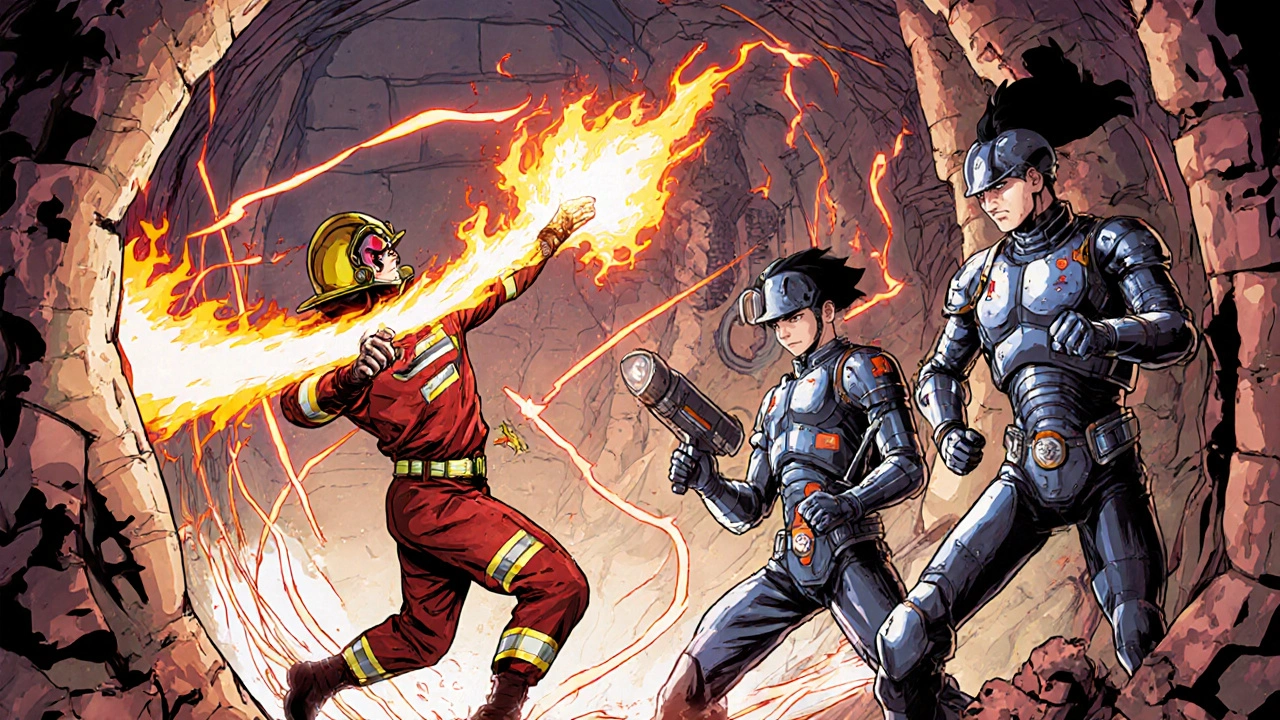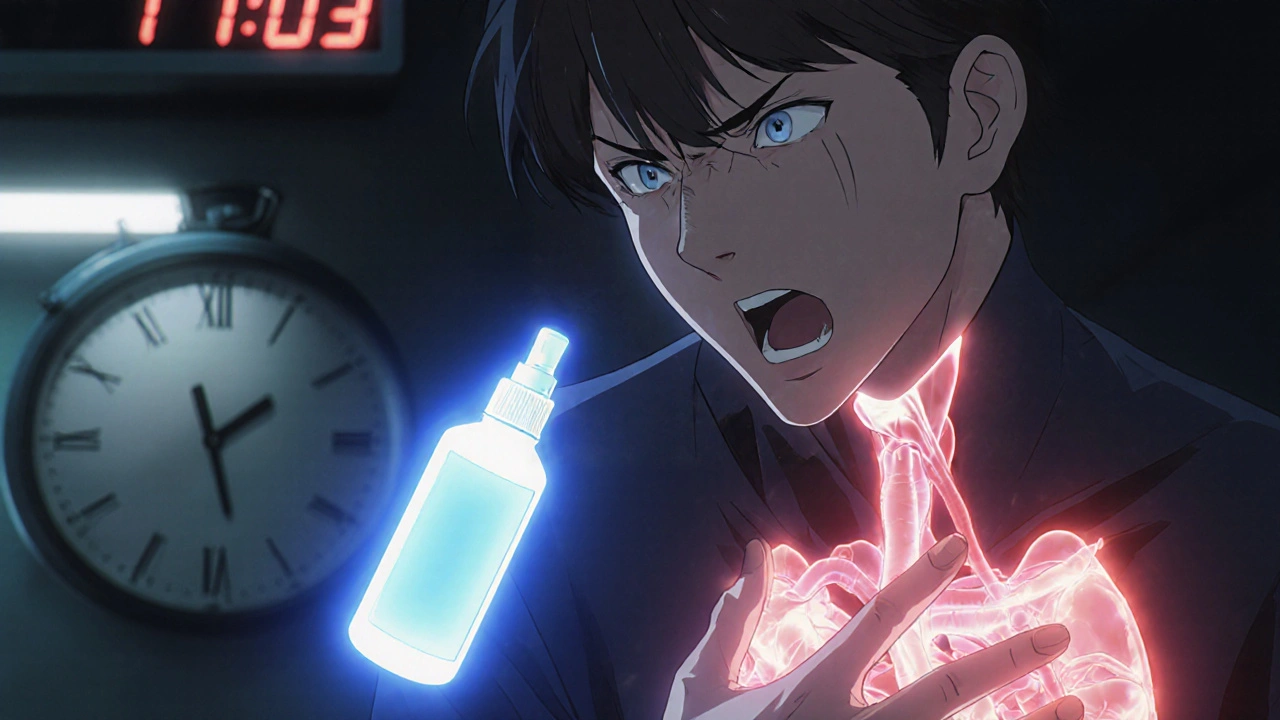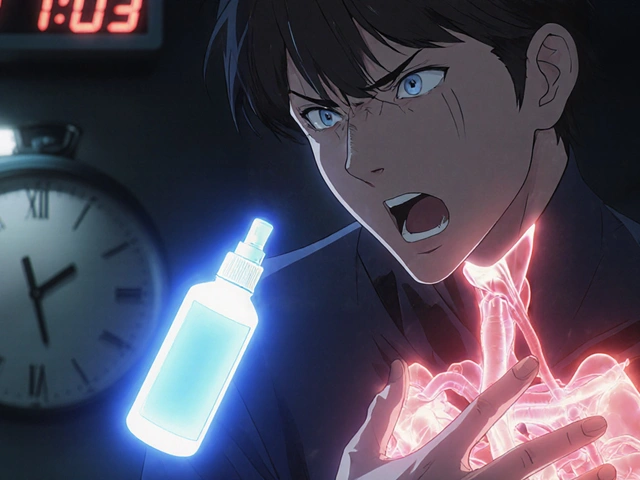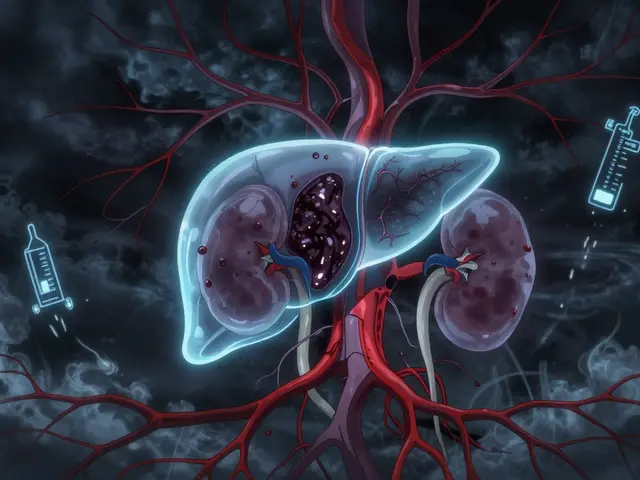Angina Medication Comparison Tool
Find the Best Angina Treatment for You
Compare medications based on your specific symptoms and health conditions. Select the medication you're considering to see how it compares to others for your situation.
Your Symptom Profile
Your Current Medication
Treatment Comparison
| Medication | When to Use | Duration | Side Effects | Tolerance |
|---|---|---|---|---|
| Nitroglycerin | Sudden chest pain | 1-3 minutes |
Headaches (up to 70%)
Dizziness
Low blood pressure
|
Develops quickly |
| Beta Blockers | Daily prevention Heart protection | 24 hours |
Fatigue
Cold hands
Dizziness
|
Minimal tolerance |
| Calcium Channel Blockers | Daily prevention High blood pressure | 24 hours |
Ankle swelling
Constipation
Flushing
|
Minimal tolerance |
| Ranolazine | Daily prevention Sudden relief | 12 hours |
Dizziness
Constipation
Nausea
|
Minimal tolerance |
Medication Selection Guide
Choose Nitroglycerin if: You need immediate relief for sudden chest pain.
Choose Beta Blockers if: You need daily prevention and heart protection.
Choose Calcium Channel Blockers if: You have high blood pressure or cannot take beta blockers.
Choose Ranolazine if: You still have angina despite other medications.
Nitroglycerin has been the go-to medicine for sudden chest pain for over 130 years. If you’ve ever had angina, you’ve probably been handed a small bottle of nitroglycerin tablets or spray - something to keep in your wallet or pocket, just in case. But it’s not the only option anymore. In 2025, doctors regularly consider other drugs that work differently, have fewer side effects, or are easier to use long-term. So what’s the real difference between nitroglycerin and its alternatives? And which one actually works better for you?
How Nitroglycerin Actually Works
Nitroglycerin is a vasodilator. That means it relaxes your blood vessels, especially the ones feeding your heart. When you have angina, your heart muscle isn’t getting enough oxygen because the coronary arteries are narrowed. Nitroglycerin opens those arteries up, letting more blood - and more oxygen - flow through. It works fast: within 1 to 3 minutes when taken under the tongue.
It’s not a cure. It doesn’t fix the underlying blockage. But for sudden chest tightness, pressure, or pain - especially during exercise or stress - it’s often the fastest way to feel relief. That’s why it’s still in emergency kits, ambulances, and patients’ purses.
But it has downsides. Headaches are common - up to 70% of people get them. Dizziness and low blood pressure can make you feel faint. And if you take it too often, your body gets used to it. That’s called tolerance. Once that happens, it stops working as well.
Alternative 1: Isosorbide Dinitrate and Mononitrate
These are longer-acting nitrates. While nitroglycerin is for quick relief, isosorbide dinitrate (Isordil) and isosorbide mononitrate (Imdur, Monoket) are designed for daily use to prevent angina attacks.
Isosorbide mononitrate, for example, lasts 6 to 10 hours. You take it once or twice a day, usually in the morning. Unlike nitroglycerin, you don’t need to take it only when symptoms hit - it’s a preventive. It’s also less likely to cause the same level of headaches.
Here’s the catch: you still build tolerance. That’s why doctors often recommend a “nitrate-free” period - like skipping the evening dose - to reset your body’s sensitivity. It’s a balancing act. But for people who get angina regularly, not just during emergencies, this is often the next step after nitroglycerin.
Alternative 2: Beta Blockers (Metoprolol, Atenolol, Propranolol)
Beta blockers work completely differently. Instead of opening blood vessels, they slow your heart rate and reduce the force of each heartbeat. That means your heart uses less oxygen overall. Less demand = fewer angina attacks.
Studies show beta blockers reduce the frequency of chest pain by 50% or more in people with stable angina. They also lower the risk of heart attacks and death in people with heart disease. That’s why they’re often the first-line long-term treatment - not just for angina, but for overall heart protection.
Side effects? Fatigue, cold hands, dizziness, and sometimes depression. People with asthma or very slow heart rates can’t take them. But for most others, they’re safer for daily use than long-term nitrates.
Alternative 3: Calcium Channel Blockers (Amlodipine, Diltiazem, Verapamil)
These drugs stop calcium from entering heart and blood vessel cells. That relaxes the vessels and reduces heart workload. They’re especially useful if beta blockers don’t work or cause side effects.
Amlodipine (Norvasc) is a common one. It’s taken once a day, has few side effects, and doesn’t cause tolerance. It’s also great for people with high blood pressure on top of angina. Diltiazem and verapamil are better for people with fast heart rhythms or those who can’t take beta blockers.
Side effects include swelling in the ankles, constipation, and flushing. But they don’t cause headaches like nitrates. And unlike nitroglycerin, they’re not meant for sudden relief - they’re daily preventatives.

Alternative 4: Ranolazine (Ranexa)
Ranolazine is the newest option. It doesn’t affect heart rate or blood pressure. Instead, it changes how heart cells use energy. It helps the heart work better with less oxygen - kind of like teaching your heart to be more fuel-efficient.
Clinical trials show ranolazine reduces angina episodes by about 1 to 2 per week compared to placebo. It’s often added when other drugs aren’t enough. You take it twice a day. It’s not for sudden attacks - you can’t use it like nitroglycerin spray.
Side effects are mild: dizziness, constipation, nausea. It doesn’t cause low blood pressure. The big downside? Cost. It’s expensive and not always covered by insurance unless other drugs have failed.
Alternative 5: Nicorandil (Available Outside the U.S.)
Outside the U.S., especially in Europe and Asia, nicorandil is used more often. It’s a hybrid - part potassium channel opener, part nitrate. It dilates blood vessels and protects heart cells from damage.
Studies show it reduces angina attacks as well as nitrates, but with less tolerance buildup. It’s also linked to a lower risk of heart attacks. But it’s not approved in the U.S. because of rare but serious side effects like mouth ulcers and skin reactions.
If you’re traveling or living abroad, you might be prescribed this. But if you’re in the U.S., it’s not an option.
When to Use Nitroglycerin vs Alternatives
Here’s how most doctors think about it:
- Sudden chest pain? Use nitroglycerin. It’s your emergency tool. Keep it handy. Don’t wait.
- Getting angina daily? Start with a beta blocker. It protects your heart long-term.
- Beta blocker doesn’t work or causes side effects? Try a calcium channel blocker. Especially if you have high blood pressure.
- Still having attacks? Add ranolazine. It’s the next layer of defense.
- Need long-term prevention without tolerance? Isosorbide mononitrate with a nitrate-free window. But don’t take it constantly.
Nitroglycerin is the firefighter. The others are the home security system.

What About Lifestyle and Other Treatments?
Medication alone isn’t enough. Studies show that combining drugs with lifestyle changes cuts angina attacks by up to 80%. That means:
- Quitting smoking - the #1 thing you can do
- Walking 30 minutes a day - even if you need to stop and rest
- Eating less salt, more vegetables, and healthy fats
- Managing stress - anxiety triggers angina
And if your arteries are badly blocked, stents or bypass surgery might be needed. Medications help, but they don’t remove plaque. Sometimes, you need to fix the pipe, not just open it.
Common Mistakes People Make
- Taking nitroglycerin too often. That’s how tolerance builds. Use it only for sudden pain, not as a daily habit.
- Not storing it properly. Nitroglycerin tablets lose potency after 3 months if the bottle is open. Keep them in the original glass bottle, away from heat and light. Spray lasts longer - up to 2 years.
- Assuming all chest pain is angina. If you’re not sure, call emergency services. Heart attacks don’t always feel like textbook angina.
- Stopping meds because of side effects. Talk to your doctor. There’s usually another option.
What Does the Research Say?
A 2023 analysis of 12 large trials involving over 15,000 patients found that beta blockers and calcium channel blockers reduced the risk of heart attack and death more than nitrates alone. Nitroglycerin was best for symptom relief, but not for survival.
Another study in the Journal of the American College of Cardiology showed that patients using ranolazine along with beta blockers had 30% fewer angina episodes than those on beta blockers alone.
The bottom line? Nitroglycerin saves lives in the moment. But long-term, other drugs do more to protect your heart.
Final Thoughts
Nitroglycerin isn’t outdated. It’s still essential. But it’s not the whole story. If you’ve been on it for years and still get chest pain, it’s time to talk about alternatives. Your doctor might not bring it up - they assume you’re comfortable with what you’ve got. But you deserve options.
Ask: "Is there a daily medication that could reduce how often I need to use my nitroglycerin?" That’s the real goal: fewer attacks, less fear, and a stronger heart.
Can I take nitroglycerin every day?
No. Taking nitroglycerin daily causes tolerance - your body stops responding. It’s meant for sudden chest pain, not daily prevention. For regular angina, doctors prescribe longer-acting drugs like isosorbide mononitrate or beta blockers instead.
What’s the safest long-term medication for angina?
Beta blockers like metoprolol or atenolol are considered the safest long-term option. They reduce heart workload, prevent attacks, and lower the risk of heart attack and death. Calcium channel blockers are a close second, especially if you have high blood pressure or can’t tolerate beta blockers.
Does ranolazine replace nitroglycerin?
No. Ranolazine helps prevent angina attacks over time but doesn’t work fast enough for sudden pain. You still need nitroglycerin for emergencies. Ranolazine is an add-on, not a replacement.
Why does nitroglycerin give me headaches?
Nitroglycerin relaxes all blood vessels - not just in your heart. That includes those in your brain, which can cause pressure and throbbing headaches. This side effect usually fades after a few days, but if it’s severe, talk to your doctor about switching to a different medication.
Can I use nitroglycerin if I take Viagra or Cialis?
Never. Combining nitroglycerin with erectile dysfunction drugs like sildenafil (Viagra) or tadalafil (Cialis) can cause a sudden, dangerous drop in blood pressure - even death. Wait at least 48 hours after taking these drugs before using nitroglycerin.
How do I know if my nitroglycerin still works?
Tablets lose potency after 3-6 months once the bottle is opened. If your spray doesn’t sting or tingle under your tongue, or if you don’t feel relief within 5 minutes, it may be expired. Replace tablets every 3 months and spray every 2 years. Always keep them in the original container, away from heat and light.








Write a comment
Your email address will be restricted to us